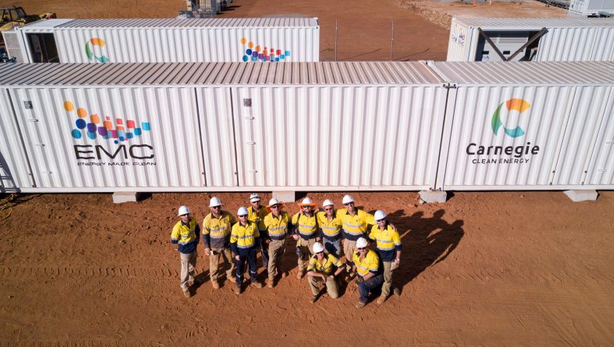WA-based renewables developer Carnegie is continuing its attempts to commercialize its CETO wave power technology. While doing so, it is moving forwards with its plans to develop utility scale solar PV and battery storage more than 600 km from the coast.
Carnegie announced on Monday that it had received approval to undertake negotiations to develop the 100 MW Mungari Solar Farm, which would feature a 20 MWh battery storage system.
The publically listed company will negotiate with the WA Department of Planning, Lands and Heritage for the proposed project site lease – which is located in the Mungari Strategic Industrial Area, 26 km south-west of Kalgoorlie.
The WA Department of Jobs, Tourism, Science and Innovation and LandCorp granted Carnegie the approval to negotiate the lease, “after a competitive process,” the company announced. It says it plans to build, own and operate the solar+storage array.
The development of the project will be contingent on the lease negotiations and a feasibility study, in which Western Power will be consulted regarding grid connection.
Mungari could be a welcome development for the region, the development of which has been hampered by limited electricity supply. The nature of the mining operations it would likely supply, however, will also prove a challenge.
Western Power has been under pressure from mining companies looking to develop or restart operations in the Eastern Goldfields region, due to its inability to supply sufficient power, for some years. The ABC has reported that miner Swan Gold had to fork out $150,000 a month, excluding fuel costs, to rent a diesel generator to supply the power it needs to restart operations at four mine sites.
“We’re sitting there with a 17-megawatt line and we’re getting 1.5-megawatts up it, and it could easily power our entire operation for the next decade, and we can’t get the power,” Swan Gold Executive Chairman Michael Fotios told the ABC.
In response, Western Power has noted that increasing capacity in the region is difficult due to the “volatile nature of the primary resources sector.” Commodity prices are prone to short term fluctuations, resulted in mines being mothballed at short notice – potentially leaving grid and generation assets stranded.
The challenge of supplying the volatile sector with electricity frequently leads to the reliance of expensive diesel to miners. While renewables and electricity generation supplied by gas pipelines may be vastly cheaper than diesel, short mine lives – at least on paper – can undermine investor confidence. This will likely also be a challenge Carnegie will have to overcome, if it is to secure investment in its proposed Mungari project.
The Eastern Goldfields is also the site of lithium mining and proposed refining activities. Lithium develop Neometals has proposed a lithium refinery nearby to Kalgoorlie-Boulder, however tight electricity supply is seen as a hurdle. It has relied on LNG trucked from Kwinana, south of Perth, for electricity generation in the past.
Neoen’s Degrussa solar project in remote WA is currently one of the largest offgrid solar+storage/diesel hybrid to supply power to a mining operation. The 10.6 MW solar and 6 MW battery array supplies the Copper and Gold mine operated by Sandfire Resources. The project was assisted by a $20.9 million grant from ARENA.
Carnegie has developed and constructed, through its microgrid developer subsidiary Energy Made Clean, a 1.6MW/2.6MWh solar+storage facility to supply the CSIRO’s Square Kilometre Array Pathfinder. It has completed the 300 kW Canarvon PV array, which the company claims was the largest offgrid project to sign a PPA in Western Australia. It is currently constructing its merchant 10 MW Northam PV project.
This content is protected by copyright and may not be reused. If you want to cooperate with us and would like to reuse some of our content, please contact: editors@pv-magazine.com.









By submitting this form you agree to pv magazine using your data for the purposes of publishing your comment.
Your personal data will only be disclosed or otherwise transmitted to third parties for the purposes of spam filtering or if this is necessary for technical maintenance of the website. Any other transfer to third parties will not take place unless this is justified on the basis of applicable data protection regulations or if pv magazine is legally obliged to do so.
You may revoke this consent at any time with effect for the future, in which case your personal data will be deleted immediately. Otherwise, your data will be deleted if pv magazine has processed your request or the purpose of data storage is fulfilled.
Further information on data privacy can be found in our Data Protection Policy.